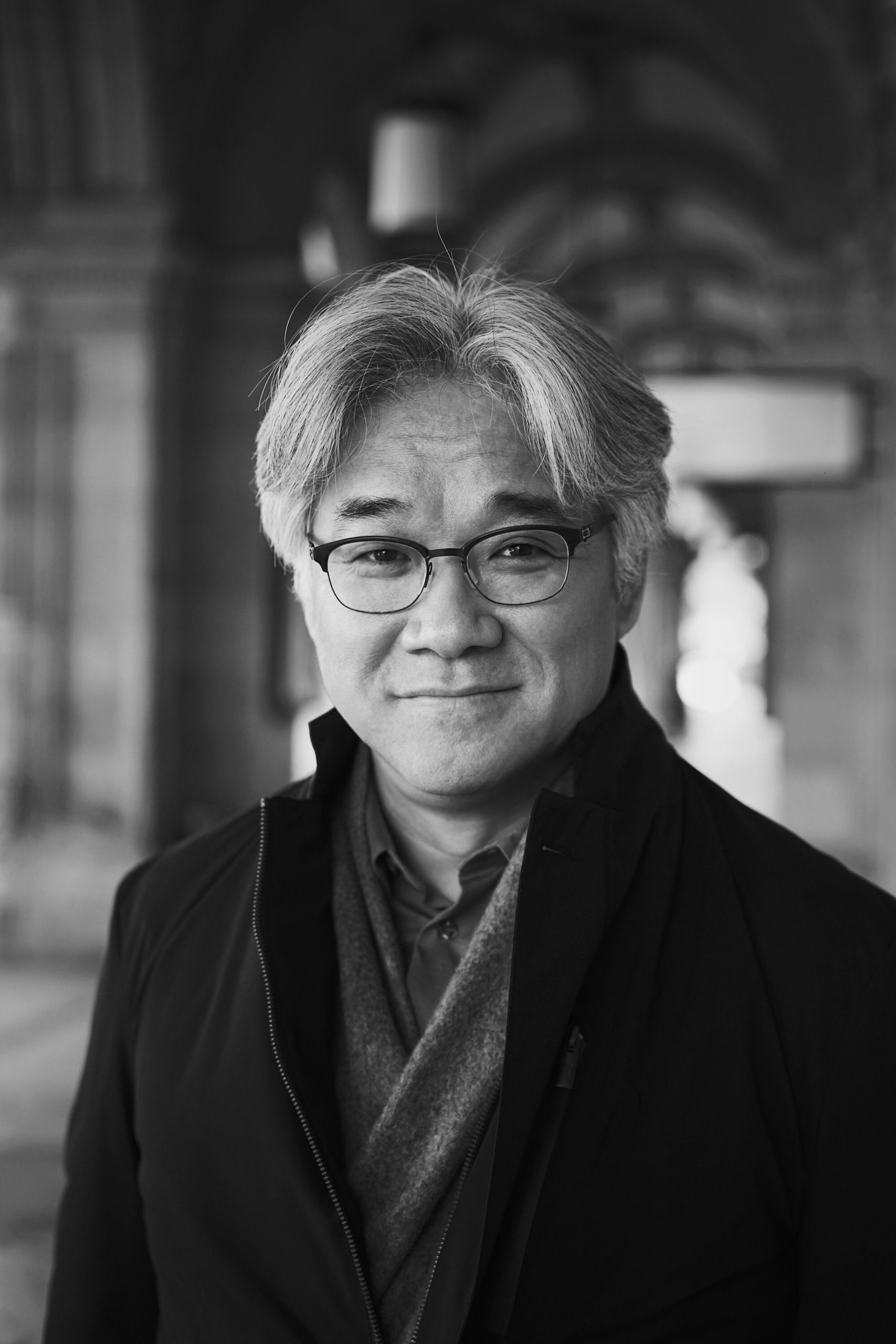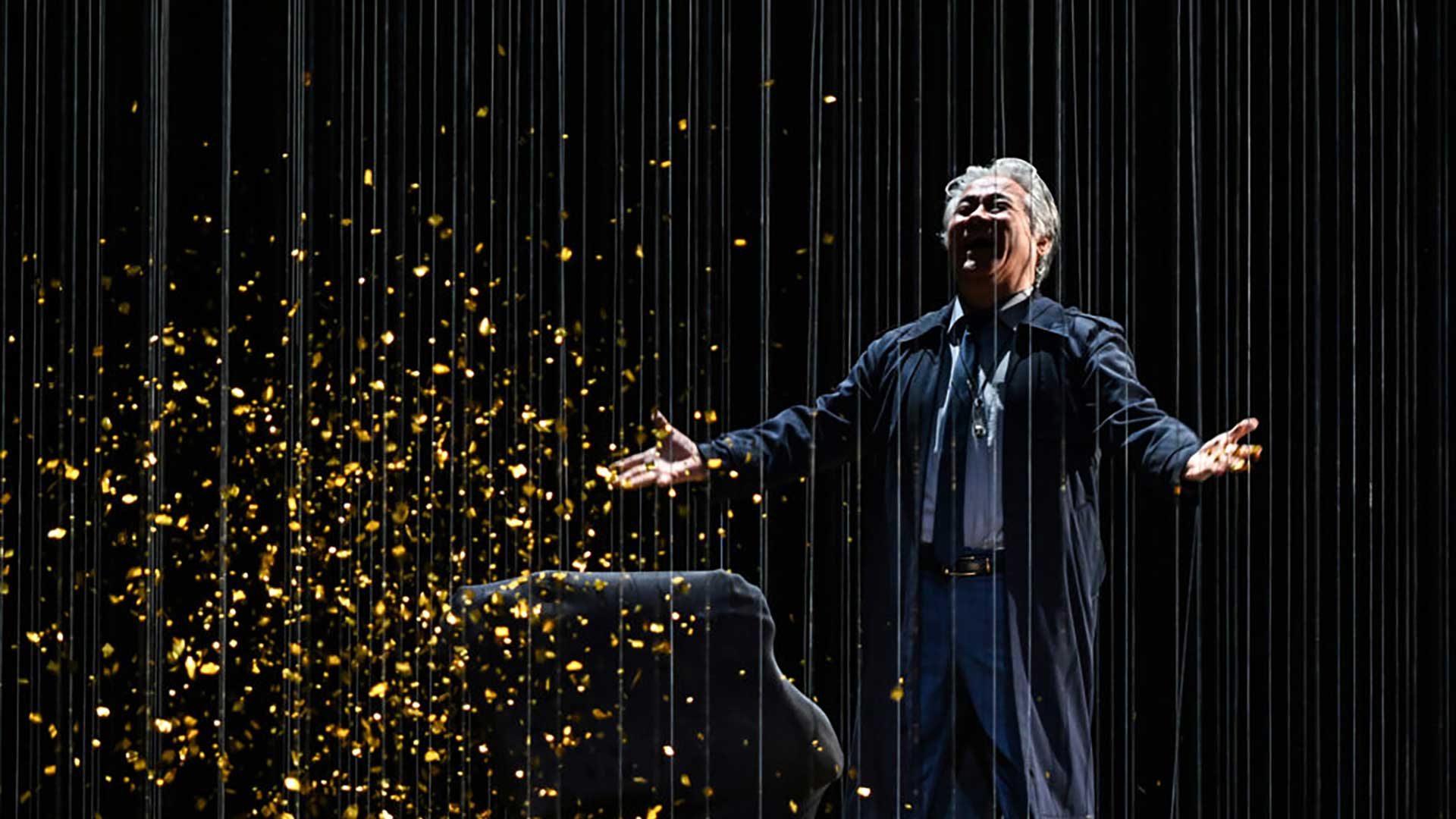Biography
Kwangchul Youn wurde in Chungju / Südkorea geboren und absolvierte an der dortigen Universität sein erstes Gesangsstudium.
Als Student gewann er den 1. Preis im Koreanischen Landesgesangswettbewerb.
1988 debütierte er an der Staatsoper in Seoul als de Sirieux in "Fedora". Als Gast sang er an weiteren koreanischen Häusern unter anderem die Partien des Basilio in Rossinis "Il barbiere di Siviglia", Loredano in Verdis "I due foscari" und Dulcamara in Donizettis "L'elisir d'amore".
Seine Studien setzte er 1990/91 an der Musikhochschule Sofia bei Prof. Lesa Koleva und von 1991 bis 1993 an der Hochschule der Künste Berlin bei Prof. Dr. Herbert Brauer fort. Währenddessen erhielt er bei nationalen und internationalen Wettbewerben mehrere Auszeichnungen, eine der wichtigsten war für ihn im Jahr 1993 der 1. Preis beim »Concours International des Voix d'Opéra Plácido Domingo« in Paris. Seitdem tritt er immer wieder Plácido Domingo auf, so im Herbst 2009 an der Staatsoper unter den Linden, Berlin, als Fiesco in "Simone Boccanegra" und bei dessen 40. Bühnenjubiläum im Teatro alla Scala, Milano, als Hunding in einer konzertanten Aufführung der "Walküre".

In Deutschland sang er 1993/94 an der Oper Leipzig unter anderem die Partien des Sarastro ("Zauberflöte") und des Komtur ("Don Giovanni").
Von April 1994 bis Juli 2004 war Kwangchul Youn festes Ensemblemitglied der Staatsoper Unter den Linden, wo er unter anderem den König in "Aida", den Minister in "Fidelio", König Marke ("Tristan und Isolde"), Bertram ("Robert le diable"), Colline ("La bohème") und Lodovico ("Otello") interpretierte.
Es folgten Engagements nach Paris an die Opéra Bastille ("Simon Boccanegra") und an das Théatre du Chatelet ("Elektra", "Fidelio") sowie an die Oper von Barcelona ("Le nozze di Figaro", "Don Giovanni", "Tristan und Isolde"). Seit 2007 ist er an der Oper Frankfurt immer wieder als Philipp II. in "Don Carlo" zu erleben. Inzwischen ist er in Bilbao, Madrid und Valencia ebenso gefragt, wie an der Wiener Staatsoper (Mephisto in "Faust") an der New Yorker Met (König Marke in "Tristan und Isolde", Ferrando in "Il Trovatore", Komtur in "Don Giovanni") und an der Royal Opera Convent Garden in London (König Heinrich in "Lohengrin").
Er gastierte bei verschiedenen Festspielen; z.B. bei den großen Festivals in Ludwigsburg, Salzburg und - seit 1996 - regelmäßig in Bayreuth.
Bei den Bayreuther Festspielen sang er mit großem Erfolg in Neuinszenierungen: 2002 den Landgrafen im "Tannhäuser", 2004 Titurel im "Parsifal" und 2005 König Marke in "Tristan und Isolde", 2006 Fasolt in "Das Rheingold" und Hunding in "Die Walküre". Hinzu kam 2008 das eindrucksvolle Rollendebut als Gurnemanz in der „Parsifal“ - Neuinszenierung von Stefan Herheim. Unter der Leitung von Daniele Gatti sang er unmittelbar nach den Bayreuther Festspielen in einer konzertanten Aufführung den Gurnemanz in der Frauenkirche in Dresden. Im Jahre 2011 war Kwangchul Youn in dieser riesigen Rolle auch im Teatro Region di Torino, im Theatre de Champs Elysées, Paris, an der Bayerischen Staatsoper München und an der Staatsoper Hamburg zu hören. Zum 60. Bühnenjubiläum von Daniel Barenboim wirkte er vom 29. bis zum 31. August 2010 am Teatro Colón Buenos Aires in Aufführungen der "Aida" und der "Messa da Requiem" von Giuseppe Verdi mit.

Neben seiner Operntätigkeit tritt Kwangchul Youn auch als Konzertsänger auf, und zwar an der Academia Santa Cecilia in Rom ebenso wie im Wiener Musikverein, im Wiener Konzerthaus (z.B. im März 2010 in der 8. Sinfonie von Gustav Mahler) und bei den Salzburger Osterfestspielen. In der Berliner Philharmonie war er in den »Requien« von Mozart und Verdi, in der Nelson-Messe von Haydn und in Beethovens "Missa solemnis" zu erleben. Unvergessliche Ereignisse sind die Liederabende mit seinem Klavierpartner Helmut Oertel, wie z.B. im Sommer 2007 im Markgräflichen Opernhaus in Bayreuth und im Herbst 2007 in der Frankfurter Oper. Im Dezember 2009 kam es im Art Center, Seoul, zu einer tief beeindruckenden Aufführung der "Winterreise" mit Myung-Whun Chung (Klavier). Regelmäßig singt er in den Silvesterkonzerten im Konzerthaus in Berlin die Basspartie in Beethovens Neunter.
Er arbeitete mit Dirigenten wie Daniel Barenboim, Christian Thielemann, Mark Minkowski, Fabio Luisi, Michael Gielen, Myung-Whun Chung, Zubin Mehta, James Levine, Horst Stein und Thomas Hengelbrock in Oper und Konzert sowie bei CD-Produktionen, z. B. bei der »Meistersinger«- Aufnahme der Bayreuther Festspiele unter Daniel Barenboim bei Teldec oder beim Label harmonia mundi ("La Didone", "Croesus"). Die Aufnahmen der Opern "Le nozze di Figaro", "Così fan tutte", "Tiefland" und "Don Giovanni" entstanden unter Bertrand de Billy und sind bei Arte Nova erschienen. Opus Arte hat eine DVD der berühmt-umstrittenen "Don Giovanni"-Inszenierung Calixto Bieito ́s aus dem Gran Teatro del Liceu, Barcelona, herausgebracht unter Bertrand de Billy mit Kwangchul Youn als Leporello. Aus Barcelona stammt auch die bei Opus Arte erschienene DVD des "Rheingold" mit Kwangchul Youn als Fasolt (Regie: Harry Kupfer). Ebenfalls mit Bertrand de Billy wurde 2009 Gounods "Faust" in der Wiener Staatsoper aufgenommen (Orfeo). Die "Daphne" - Produktion des Labels Decca unter Semyon Bychkov wurde bei den Grammy-Awards 2006 als beste Opernproduktion nominiert. Im Jahr 2009 kam als Produktion des WDR bei Profil Medien eine unter der Leitung von Semyon Bychkov entstandene SACD des "Lohengrin" heraus. Neben Kwangchul Youn als König Heinrich wirkten u.a. mit: Johan Botha, Adrianne Pieczonka, Petra Lang und Falk Struckmann. Die Aufführung der "Walküre" von den Bayreuther Festspielen unter der Leitung von Christian Thielemann mit Johan Botha, Albert Dohmen, Edith Haller und Linda Watson ist 2011 bei Opus Arte erschienen.
Repertoire
ADAM
(Der Postillon von Lonjumeau)
D´ALBERT
Tommaso (Tiefland)
BEETHOVEN
Don Fernando & Minister (Fidelio)
BELLINI
Oroveso (Norma)
BERLIOZ
Narbal (Les Troyens)
DEBUSSY
Arkel (Pelléas und Mélisande)
DONIZETTI
Enrico VIII, re d'Inghilterra (Anna Bolena)
Dulcamara (L'Elisir d'Amore)
Raimondo (Lucia di Lammermoor)
DUCAS
Barbe-Bleue (Ariane et Barbe-Bleu)
GIORDANO
de Sirieux (Fedora)
GOUNOD
Méphistophélès (Faust)
KEISER
(Croesus)
LORTZING
(Zar und Zimmermann)
MILHAUD
(Christoph Columbus)
MEYERBEER
Bertram (Robert le diable)
MOZART
Don Alfonso (Cosi fan tutte)
Sarastro (Die Zauberflöte)
Don Giovanni, Leporello & Komtur (Don Giovanni)
Figaro & Bartolo (Le Nozze di Figaro)
PUCCINI
Colline (La bohème)
Tosca
ROSSINI
Basilio (Il barbiere di Siviglia)
SAINT-SAENS
Ein alter Hebräer (Samson und Dalila)
SCHOENBERG
(Moses und Aaron)
STRAUß
(Daphne)
(Elektra)
Erster Nazarener (Salome)
VERDI
Ramphis & Der König (Aida)
Attila (Attila)
Philipps II & Großinquisitor (Don Carlos)
Loredano (I due Foscari)
Ferrando (Il Trovatore)
(Jerusalem)
Padre Guardiano & Marchese di Calatrava (La forza del destino)
Banquo (Macbeth)
Lodovico (Otello)
Fiesco (Simon Boccanegra)
WAGNER
Fasolt (Das Rheingold)
Hunding (Die Walküre)
Pogner & ein Nachtwächter (Die Meistersinger von Nürnberg)
Heinrich der Vogler, deutscher König (Lohengrin)
Gurnemanz & Titurel (Parsifal)
Hermann, Landgraf von Thüringen (Tannhäuser)
König Marke (Tristan und Isolde)
BEETHOVEN
Missa Solemnis
Sinfonie Nr. 9
HAYDN
Nelson-Messe
MOZART
Requiem
SCHOENBERG
Gurre Lieder
VERDI
Messa da Requiem


